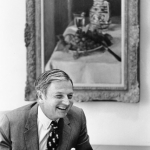David Rockefeller, who died last week at 101, was a giant among American philanthropists. He continued the tradition of giving that ran from his grandfather, John D., the founder of Standard Oil; through his father, John Jr.; and his oldest brother, John III.
In his lifetime, Mr. Rockefeller gave away an estimated $2 billion to organizations, from Harvard and Rockefeller Universities to a “Living Pyramid” made of wild grass and flowers in Queens. “No individual has contributed more to the commercial and civic life of New York City over a longer period of time than David Rockefeller,” Michael R. Bloomberg, the former New York mayor, said in a statement.
But along with the immensity of his largess, Mr. Rockefeller used his charitable gifts to instill in his children and grandchildren a sense of the family’s philosophy of giving. In doing so, he also transmitted family values — including humility, responsibility and engagement — to a group that now numbers 40, including spouses.
“What I’m standing here in appreciation of, with my grandfather having just passed, is the gift of inheriting a philanthropic tradition while being empowered to make it my own,” said Michael Quattrone, Mr. Rockefeller’s grandson and chairman of the David Rockefeller Fund, one of four family philanthropic vehicles that Mr. Rockefeller was involved with.





